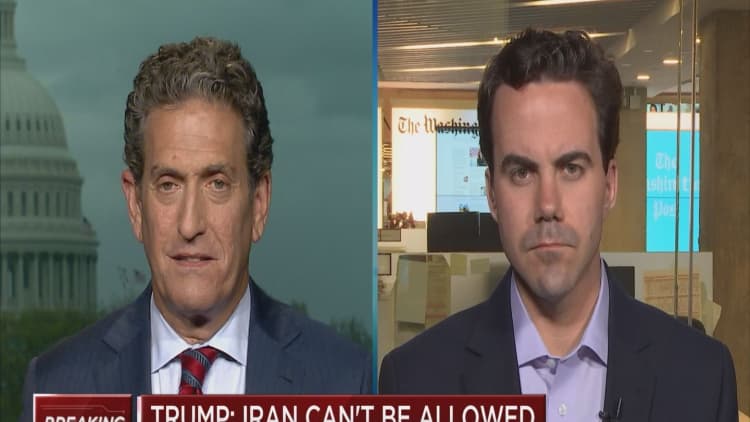French President Emmanuel Macron is in Washington this week on a charm offensive with a mission: to convince his counterpart Donald Trump to keep the Iran nuclear deal intact.
But while the two leaders have developed what appears to be an affable friendship, analysts said this is unlikely to save the 2015 agreement, officially known as the JCPOA, which was signed by six world powers and Iran to lift international sanctions on the latter in exchange for restrictions on its nuclear program. Instead, despite Macron's visit, its eventual end still appears more likely than not.
Macron may have indeed "successfully bought time to gin up support for a new accord," said Henry Rome, Iran researcher, and Cliff Kupchan, chairman, in a note from political risk consultancy Eurasia Group. This would be a notable achievement in itself given Trump's vocal disdain for the deal.
But this is expected to be only a temporary success. "Macron's comments do not change our overall call that the Iranian nuclear deal has a 65 percent chance of collapsing during Trump's first term," the analysts said.
Trump is required to recertify the agreement every 90 days or leave its fate to Congress. The next deadline is May 12, and European Union (EU) leaders, in particular, are hoping that he will decide to waive sanctions as he did during previous deadlines, although he warned that last January's waiver was Iran's "last chance."
Meanwhile, Trump's anticipated meeting with North Korean President Kim Jong Un in the next few months also provides a reason to let the May deadline slide — proponents of the deal have stressed that abandoning it would only harm America's credibility in negotiating agreements with other states. If the deal survives May, its next hurdle would be the next waiver due on July 11.
Trump's messages have been mixed coming out of the bilateral talks, calling the deal "insane" and "ridiculous" while also saying he would discuss it and that he and Macron could achieve an agreement "fairly quickly."
Macron's strategy is more innovative than previous attempts at changing the president's mind; he is suggesting the addition of new points to the agreement that attempt to address some of the U.S. president's concerns. These include prohibiting Iran from testing ballistic missiles and forcing restrictions on its regional activities in countries like Syria, Lebanon and Yemen.
But it does not cover one major thorn for the Trump administration: sunset clauses that lift key nuclear restrictions by 2025. The White House is demanding the elimination of these clauses, while Iran and European signatories oppose their removal.
'A change in tone'
The deal's supporters, including its architects in the Obama administration, argue that the pact has effectively curbed Iran's nuclear development while helping stabilize the Middle East. Testimony from the International Atomic Energy Agency (IAEA) and UN inspections has confirmed Iran's compliance with the deal's rules.
But Iran hawks and Trump supporters are among those who view the deal as reckless and want to see harsher controls on the Islamic Republic for its missile testing, regional military activity and human rights abuses.
Despite the challenges, many observers — including those in the markets — took stock of Trump's softened tone this week. Oil prices fell on the presumption that disruptive sanctions on Iran, OPEC's third-biggest producer, may be less likely.
Roger Matthews, a senior international trade lawyer at Dechert LLP, saw the developments as encouraging. "President Macron has apparently acknowledged that there is a place for a 'bigger, better' agreement with Tehran that can tackle pressing issues while adhering to the current deal, Matthews said. "President Trump, in response, has adopted a more positive, less confrontational tone."
But, he cautioned, "A change in tone is not the same as a change in position."
While Trump appeared more conducive to a compromise during talks with Macron, he is under the increased influence of foreign policy hawks John Bolton and Mike Pompeo, his national security advisor and secretary of state nominee, respectively, who staunchly oppose the Iran deal. The coming days will be a test of how far personal influence can shape the commander-in-chief's decision-making on world affairs.



